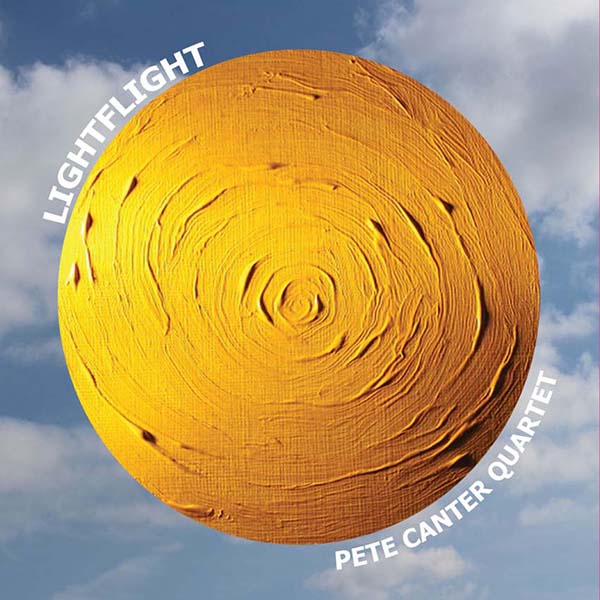
by Ian Mann
June 25, 2013
/ ALBUM
The album reveals Canter to be a skilled composer across a range of jazz styles and an inventive soloist with a distinctive sound on both of his saxophones.
Pete Canter Quartet
“Lightflight”
Pete Canter is a saxophonist, composer and educator based in Devon who performs in a variety of instrumental formats (duo, trio, quartet) and styles (the quartet Get Rich Quick tackles free jazz and electronica). A glance at Canter’s website http://www.petecanter.com reveals that he also plays the drums, doubling up on sax and percussion in Get Rich Quick and performing behind the kit as part of the jazz funk quintet Remo fronted by saxophonist Tony Kaye and trumpeter Gill Baker. He is also the co-organiser of Exeter’s popular Bridge Jazz Club.
The majority of Canter’s recordings have been in the quartet format and this self released set of original tunes represents a follow up to 2009’s well received “Ununbium”. Bristol based pianist Jim Blomfield appeared on that recording and he returns here, this time joined by two fellow musicians from the Bristol area, bassist Sol Ahmed and drummer Mark Whitlam. The current Canter Quartet is thus comprised of some of the best jazz musicians in the West of England.
“Lightflight” represents a good advertisement for Canter’s compositional skills as the quartet tackle pieces ranging across a variety of jazz styles. Opener “Tynes” is a modal, minor blues in 6/8 that features the leader’s Coltrane style tenor as he stretches out following Blomfield’s opening solo. There’s also an extended feature for Whitlam’s drums above an extended modal piano vamp.
“Conversation” also features Canter’s tenor on a piece that begins as a waltz before shifting into 7/8 for solos from Canter and Blomfield. Canter’s slightly gruff tone contrasts well with Blomfield’s flowing lyricism. The Bristol based pianist is one of the most inventive keyboard soloists around, I’ve always been hugely impressed whenever I’ve seen him perform live including his recent appearance with alto saxophonist Kevin Figes’ quartet at the Queens Head in Monmouth. The title of the composition is sourced from the dialogue between sax and piano that finally resolves the piece.
Canter switches to soprano for the title track, his tone keen and incisive. He sometimes uses the name “Lightflight” for quartet sessions that see him specialising on the soprano. The saxophonist really soars here as he shares soloing duties with Blomfield above the infectious Latin inflected rhythms of Ahmed and Whitlam.
In 2010 Canter was commissioned to write a “jazz meets classical” suite for Exeter’s Vibraphonic Festival. The work was entitled “Sketches” and two of the pieces have since been adapted and re-arranged for jazz quartet for inclusion on this album. The first of these is “One For Eddie”, Canter’s dedication to the late jazz educator Eddie Harvey who taught Canter at his (Harvey’s) jazz improvisation workshops in the 1980’s. Harvey’s death is relatively recent and the mood is suitably reverent albeit with some adventurous harmonies that would doubtless have pleased the great man.
There’s also some intentionally nostalgic swing passages as the quartet combine the traditional with the contemporary, frequently juxtaposing the two styles. At a little under nine minutes it’s the lengthiest and most ambitious piece on the album but works extremely well with each member of the group rising to the challenge. One senses that Eddie Harvey would have approved.
“Lurch” is an altered blues that begins with the sound of Canter’s unaccompanied tenor and goes on to embrace a first solo from Ahmed, a good demonstration of his deeply resonant tone and admirable dexterity. Canter and Blomfield follow, improvising imaginatively around the blues theme.
Despite the title “Bicycle”, originally written for the “Sketches” project, turns out to be a haunting minor ballad featuring Canter’s warm, breathy tenor. His solo is a master-class in ballad playing, retaining sufficient grit to prevent the music tipping over into sentimentality. There’s plenty of wit and invention behind the lyricism Blomfield’s contribution too while Whitlam’s imaginative brushwork is a delight throughout.
“Chimes” combines swing and Latin rhythms and is the vehicle for warm and inventive solos from Canter and Blomfield with both men stretching out expansively to good effect.
The second soprano feature on the album is “Pairs”, a breezy outing that fuses swing, Latin and modal ideas. It’s a vehicle for fluent solos from Canter, Blomfield and Ahmed as Whitlam handles the rhythmic changes with aplomb.
“Pendulum” adopts an arresting 5/8 groove that fuels urgent solos from Canter and Blomfield.
The album concludes with a reprise of “Conversation”, a Latin inflected version which develops from a languid start to incorporate solos from Canter and Blomfield plus a drum feature from the consistently excellent Whitlam.
Although it doesn’t pull up any trees, and very probably doesn’t aspire to, overall I was impressed with “Lightflight”. The album reveals Canter to be a skilled composer across a range of jazz styles and an inventive soloist with a distinctive sound on both of his saxophones. He receives great support from his Bristolian trio. Blomfield is an inspired piano soloist with much to say and Ahmed is a subtly propulsive bassist and a fluent soloist when called upon. Whitlam’s colourful and varied drumming is impressive throughout as he responds imaginatively to Canter’s compositional ideas.
I’m not sure how often this particular quartet gets to play live but I’m sure that they’d be well worth seeing. In the meantime jazz listeners in the West of England are advised to take time to check out Pete Canter’s other projects plus Exeter’s Bridge Jazz Club.
blog comments powered by Disqus